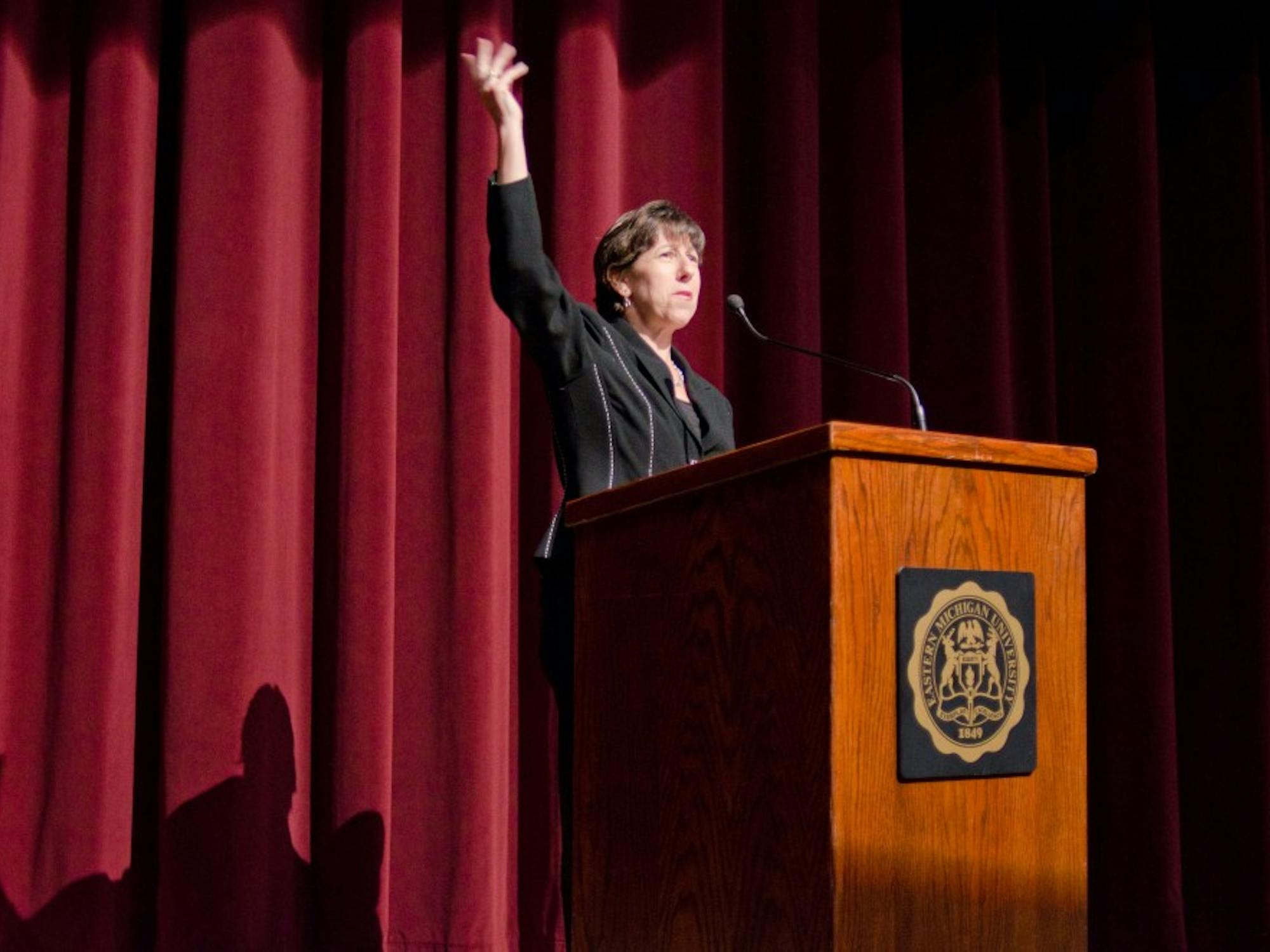Sheryl Stolberg provided her audience with insight into the world of politics and journalism with stories of her endeavors as White House correspondent for The New York Times at a talk in Eastern Michigan University’s Student Center Auditorium last Wednesday.
The event, hosted by Student Government, went from 7-10 p.m.
Stolberg, a two-time shared Pulitzer Prize winner, painted a picture of her journey “[reinventing herself] as a journalist.”
After working at the Providence (R.I.) Journal and the Los Angeles Times, she joined The Times in 1997 as a science correspondent for the Washington bureau. Later, she inquired about the possibility of covering Congress.
“I arrived on Capitol Hill in the winter of 2002,” she said. “I have to say it was kind of a culture shock. I had spent five or six years interviewing scientists and doctors. When you work for The New York Times, you discover that every doctor in America and some overseas wants their name in The New York Times. They’re all too happy to be interviewed and now suddenly I was in the capital running after members of Congress, most of them I didn’t recognize, hustling for quotes.”
One of those members of Congress happened to be Barack Obama, serving as an Illinois senator. Stolberg told the story of how she approached the then-new senator who had written a book she found “really good.” The book Stolberg was referring to was “Dreams from My Father,” and the future president said he had a new novel on the way.
In another conversation Stolberg had with Obama, she asked how the second book could be as good as the first.
“You frankly only get a chance to tell that good of a story once,” Stolberg said.
Obama took this conversation into account as he recounted the event in the novel. He granted
Stolberg anonymity when she appeared in “The Audacity of Hope.”
“ [I was an] unnamed reporter asking him if he could make this book as good as the last one,” Stolberg said.
She also spoke of where she had traveled to write stories. Her career has taken her all over the world, from flying over Mt. Kilimanjaro at sunset to going to a Polish president’s private retreat on the Baltic Sea.
“I feel like it’s a real honor and a privilege to have been able to just see some of these places and have some of these experiences that aren’t open to the public,” she said.
Stolberg acknowledged the cons to covering the White House as well as the pros. She said the hours were grueling and the political discourse on the U.S was tough.
“In a class I was in earlier today, someone asked me, a student from the Netherlands, why [the U.S. is] so divided, why politics is such a bitter subject in this country,” she said. “And you can see it. I can see it in my email. When you cover the White House, the haters come out. So when President Bush was in office, people would write letter calling him evil, a warmonger … And now that President Obama is in office, you would be shocked at some of the racist language people use to describe him.”
Astrid Den Boer, a Dutch exchange student who earlier asked Stolberg about the bitter divide in U.S. politics, said, “I noticed here in the states that politics is a sensitive subject. I was wondering if she saw that protest develop and if she could explain why it’s so sensitive.”
There were plenty more questions for Stolberg when she allowed the audience to ask at the end of the presentation. The audience was shy at first and then, as the questions got flowing, the auditorium of people became eager to release their curiosity with questions ranging from Stolberg’s opinion on current events such as Occupy Wall Street to more personal questions, such as her favorite place traveled.
“She’s a really good speaker and she had interesting stories,” Den Boer said. “She told nice anecdotes, and it was informative as well. You got a really nice insight into what her work was about.”
Stolberg no longer covers the White House but is still active in politics.
“Today I am not covering the White House anymore, I left that job in March and I’m writing, exclusively, biographical profiles of the presidential candidates,” she said. “It’s a great job, I absolutely love it.”









